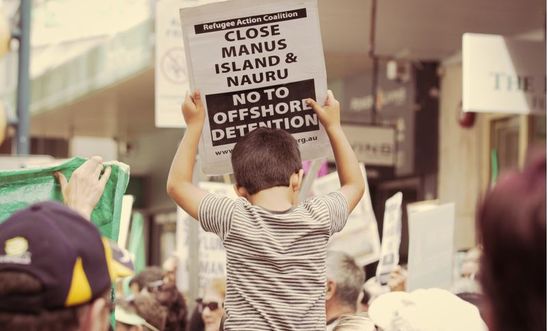
Press releases
Manus Island: Refugees moved from 'one hellish situation to another'

- New facilities unsafe and do not meet refugees’ basic needs
- Refugees say they live with constant fear of violence from locals
- 88% suffering from depression or post-traumatic stress disorder
- Informal curfew advised to mitigate security risks
Australia has used a deliberate system of cruelty to increase the hardship suffered by refugees and asylum-seekers in detention centres on Manus Island, Amnesty International said in a new report today.
Following the Australian government’s withdrawal from its detention centre last year, Punishment not protection, documents the demeaning and deeply humiliating way in which refugees have since been shuttled between prison-like centres on the island.
The report also explores the ongoing harm of prolonged detention on the island, including the impact of psychological trauma and violent threats.
Kate Schuetze, Amnesty International’s Pacific Researcher, said:
“Moving refugees and asylum seekers from one hellish situation to another is not a solution, it is just prolonging these desperate men’s suffering.
“Refugees told us they had been robbed and assaulted. The new centres are not just a safety risk but also leave those who live there without basic services.
“Instead of implementing new and creative ways to shirk its responsibility and violate international law, the Australian government must end this wilful policy of cruelty and neglect. It must do the only safe and legal thing, which is to bring these men to its own shores and offer them the protection they need and deserve.”
From one unsafe camp to another
On 31 October 2017 the Australian government withdrew all services to its detention centre on Manus Island – where it has sent hundreds of men since 2013 as part of its illegal “offshore processing” policies.
Refugees were told they would be transferred to newer centres. Fearing it was too dangerous to move closer to town, they staged peaceful protests in response. Papua New Guinea (PNG) police then forcibly evicted and transferred the refugees to three newer facilities in late November.
Amnesty’s research – based on interviews with 55 refugees and asylum-seekers – reveals that the new facilities are far from safe and fail to address the fundamental problems with Australia’s offshore processing.
Several refugees have been violently attacked by locals in recent years on Manus Island, in cases that did not result in any prosecutions. The newer facilities now offer less protection than the previous centre – closer to Lorengau town and lacking basic security infrastructure like fences.
Many refugees told Amnesty that they were too afraid to leave the centres due to the risk of violent attacks or robberies by locals. The police’s repeated failures to investigate attacks or hold those responsible to account has further undermined trust in the authorities and created a climate of impunity.
Joinul Islam, a 42-year-old Bangladeshi man, said:
“I’m not coming to Lorengau because Lorengau is a very dangerous place. Three months ago, I came to Lorengau and someone cut my [arm]. They took my mobile and my money. It’s a very dangerous place…I don’t like to come to Lorengau.”
In recent weeks, a stand-off between rival security guard companies, resulting in confusion about who is in charge of providing security, has added to the sense of insecurity.
On 21 January 2018, the UN Refugee Agency (UNHCR) also noted ‘while no formal curfew is in place, local police have advised all refugees and asylum-seekers to return to their accommodation by 6pm each evening to mitigate security risks’.
Ongoing harm
The psychological trauma of prolonged detention has taken a serious toll on refugees, with 88% suffering from depression or post-traumatic stress disorder.
Despite this, the new centres are only served by one small medical clinic and a public hospital.
Refugees also remain subject to severe restrictions on their freedom of movement. Most unable to leave designated accommodation facilities on Manus Island or in Port Moresby. They are reduced to surviving on a basic living allowance that is insufficient to cover their food, medicine and other expenses.